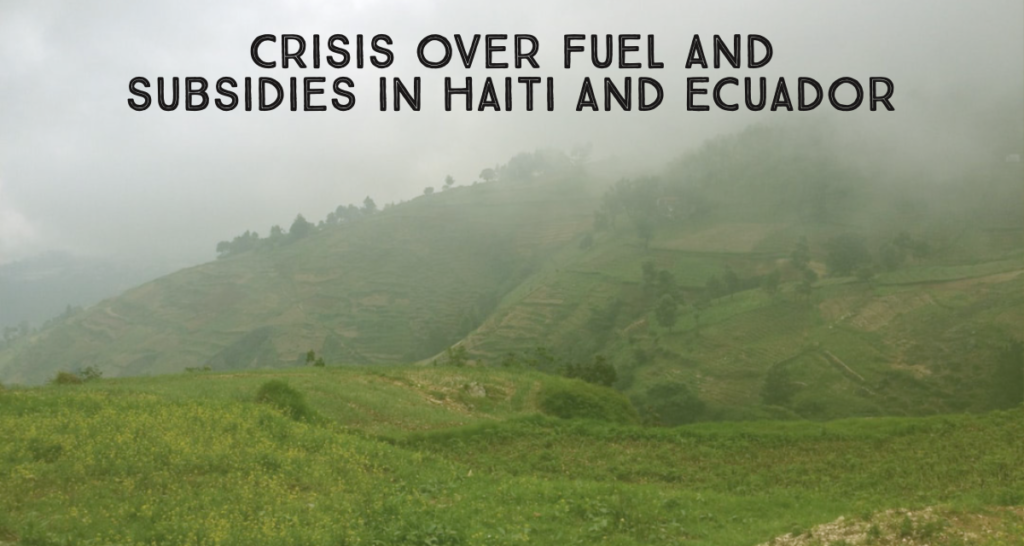Two wings of the same bird: Crisis over fuel and subsidies in Haiti and Ecuador
Violent clashes broke out between protesters and police in both Haiti and Ecuador after the governments of both countries eliminated fuel subsidies, following the instructions of the International Monetary Fund. Latin America and the Caribbean has a long history of following policies imposed by the IMF as well as the World Bank as a condition to get loans and financial benefits from those two institutions. Those policies along with the foreign debt crisis have affected the continent for decades. The situation in Ecuador and Haiti are good examples of the direct impact of that in the everyday life of the people there. That is what we would call “two wings of the same bird.” It is two countries facing the same root cause of their problems.
In Ecuador, President Lenin Moreno declared a “state of emergency” last Thursday following demonstrations against rising fuel prices, due to the government scrapping subsidies. Ecuador’s President Lenin Moreno announced Tuesday the elimination of gasoline subsidies, labor reforms, tax changes and other economic measures aimed at complying with the conditions of the loans granted by the International Monetary Fund (IMF). See the news regarding Ecuador on the following links:
https://www.news.com.au/world/south-america/ecuador-declares-state-of-emergency-over-fuel-crisis/news-story/0018cef43c1c2ca0c005b776dad13134
https://www.telesurenglish.net/news/Ecuador-Protests-Called-After-Morenos-Neoliberal-Reforms-20191002-0007.html
Blanca Puma, Executive Director of FEDICE, Global Ministries partner in Ecuador, said that, “the measures taken by the government, far from being of help, will generate more poverty, more marginalization for people who do not have economic resources and are now affected even more in their squalid family economies.” Regarding the element of justice on those policies, Blanca said that it is absent. “The government only wants to guarantee the resources to fulfill its commitments with the IMF, and is sacrificing the well-being of the majority of Ecuadorians. I say the majority, because there is a minority that have the resources. The measures probably affect them, but not in the dimension that it affects us in the middle and lower classes.”
In Haiti, the situation is similar to the one in Ecuador. Since July 2018, the International Monetary Fund and World Bank have long urged Haiti to phase out fuel subsidies. The government of President Jovenel Moise, who took office in February 2017, is having problems finding the money to pay public employees – threatening to increase stress at a moment when Haitians are already beset by runaway inflation, the sharp depreciation of the gourde (Haitian currency), and fuel shortages. The energy squeeze is due in part to a reduction in the amount of crude oil Venezuela supplies on generous terms – with much of the bill payable over 25 years at an interest rate of just 1 percent – to Haiti and other Caribbean and Central American nations under the PetroCaribe program. When the Moise administration took the first step towards phasing out subsidies in July 2018, Haitians responded with violent protests, and the president abandoned the plan. Now the government imposed that policy again, with the result of more violence and death in the streets of the country.
You can read about the Haitian situation here: https://www.efe.com/efe/english/world/question-of-fuel-subsidies-lies-at-the-bottom-haiti-s-crisis/50000262-4006526
Polycarpe Joseph, Executive Director of House of Hope, one of our two partners in Haiti, described the situation as follows: “For about three weeks, the country is blocked; nothing works. Violence, frustration, misery prevail almost everywhere, and violent street demonstrations are our daily bread. Stores are looted, demonstrators are killed, cars burnt, houses are vandalized and burned. Faced by the intensity of the violence, the majority of the population is afraid and locked up in their homes. Hunger prevails everywhere because markets are not supplied, even running water is scarce; all roads are almost blocked.”
The National Spiritual Council of Churches of Haiti (CONASPEH) also addressed the situation in a recent press release. Rev. Dr. Francoise Villier, CONASPEH’s General Bishop, stated, “This situation threatens the sovereignty of our country, its dignity, and its achievements, among others. It is sad to witness that the stubbornness of a closed figure in his pride (a false pride) threatens our sovereignty and pushes us towards an occupation unworthy of our status as the first black republic of the world.” Bishop Villier said, “It’s time to start thinking seriously about our country.” She asked President Jovenel Moïse, “To show patriotic awareness and not let his pride take over.” She also advised to the Haitian people, “faced with this situation” that, even though “we know that you cannot wait, it is crucial not to destroy the country and be careful not to bury it in a civil war that could lead to a new occupation. Let us fight for what is true and protect life. May the Lord help us!”
Global Ministries continues its accompaniment with our partners in Haiti and Ecuador through sustainable development and educational initiatives, and also accompanying them in a pastoral and prophetic way. Our partners are aware that there are heavy socioeconomic burdens that international financial institutions lay on the shoulders of the people (Matthew 23:4 NRSV). It is our task to walk alongside them in their ministry in favor of the poorest of the poor.

